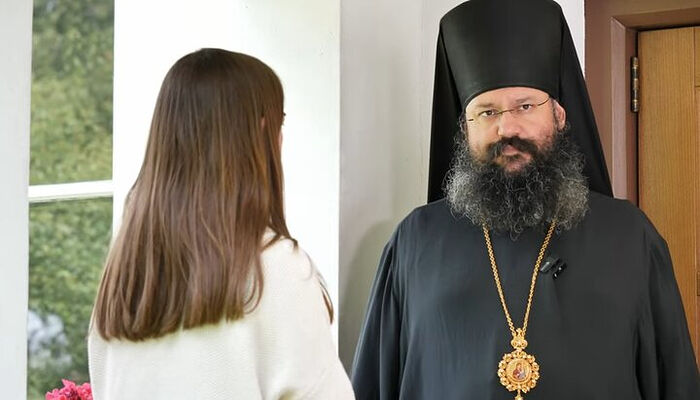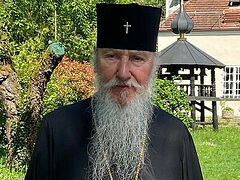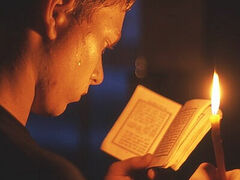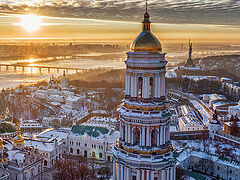Munich, June 18, 2022
 Bp. Job of Stuttgart. Photo: YouTube screenshot
Bp. Job of Stuttgart. Photo: YouTube screenshot
The Russian Orthodox Church Outside of Russia commemorates the Patriarch of Moscow in the Divine services as a manifestation of the unity of the Russian Church, but this doesn’t indicate agreement with his political position on the war, says the new auxiliary bishop of ROCOR’s German diocese.
In a recent interview with the ROCOR-German Herald on YouTube, His Grace Bishop Job of Stuttgart, who was consecrated to the episcopacy on December 10, spoke about ROCOR’s attitude towards the war, the position of the Patriarch, the recent changes in the Ukrainian Church, and rumors circulating online concerning the status of the Church Abroad.
In particular, he emphasized that ROCOR has many Ukrainian parishioners and has complete confidence in His Beatitude Metropolitan Onuphry of Kiev and All Ukraine and the Ukrainian hierarchs, and that ROCOR remains a part of the unified Russian Orthodox Church, but that it can’t agree with how the Patriarch brings the Church itself into the present conflict.
At the same time, like his ruling hierarch His Eminence Metropolitan Mark of Berlin in an interview last month, Bp. Job also notes that media manipulation is at play in the present crisis.
Read the full text of the interview below:
—The Russian Orthodox Church abroad is repeatedly called upon to distance itself from Patriarch Kirill of Moscow and All Russia and to condemn his attitude to the war in Ukraine. We are located in the Monastery of St. Job of Pochaev in Munich. It also houses the administration of the German Diocese of the Russian Orthodox Church Abroad. Bishop Job of Stuttgart, the auxiliary bishop of the diocese, has agreed to express his position on these burning issues. We receive repeated demands from parishioners, but also from the German public, for the Church to take a stand on the statements of the Patriarch, to distance itself from him, especially with the accusation that he would support the war in Ukraine or even justify it as a cultural struggle. How do you deal with such demands?
—The Russian Orthodox Church abroad is an autonomous part of the Russian Orthodox Church and also has a naturally different attitude due to the fact that it is located abroad. We can commemorate the Patriarch of Moscow in our services to express the unity of the Russian Church. However, this shouldn’t be confused with political support or support for his personal position.
Our Church Abroad also traditionally has very close contacts with the Ukrainian Church and we have a lot of faithful Ukrainians with us in our communities. Therefore, of course, we sympathize with what’s happening there and also actively help the arriving refugees. We also organize aid convoys.
We don’t agree on all points with the position of the Patriarch. But there are also some misrepresentations of the position of the Patriarch in the Western media. It’s not true that the Patriarch blesses weapons for war. It’s also not true that the Patriarch would support or approve the political idea of the Russian World, which is connected with certain territorial claims outside the Russian Federation. In fact, the Patriarch places the current war in Ukraine in the context of a cultural struggle between East and West, and in particular a struggle between Eastern and Western values. In doing so, he’s dragging the Church itself into this conflict, and we can’t endorse this.
—You said that the commemoration of the Patriarch isn’t a political statement, but an expression of liturgical and ecclesial unity. However, a few days ago the Church of Ukraine declared its complete independence from the Patriarchate of Moscow. How should we understand this?
—This was an inevitable step in the face of this military conflict between the two countries and the fact that the Ukrainian Church has been persecuted and discriminated against by the authorities for years. We in the Church Abroad still have full confidence in Metropolitan Onuphry of Kiev and all Ukraine and in the Ukrainian episcopate that they’re doing the right thing in this difficult situation.
—We, the Church Abroad, are also an autonomous Church. Is it true that the Church Abroad is also planning or considering complete independence from the Moscow Patriarchate?
—No, it’s not true. There are some false ideas circulating on the internet. The Church Abroad sees no reason to renounce the Moscow Patriarchate. The political opinions of the Patriarch aren’t reason enough for an ecclesiastical canonical separation. It must be said that it’s a special feature of the Russian Orthodox Church that it has integrated the autonomous Churches belonging to it in a special way. As an autonomous part of the Russian Church so far, the Ukrainian Church has had a great influence on the decisions of the Russian Church. All our bishops are part of the Council of the Russian Church, and for the Ukrainian Church, this has been of great importance, what they have contributed so far.
—Well, regardless of the political or Church-political assessment of the conflict and the attitude of the Church, do you also see opportunities for a real reconciliation with regard to the mood in the communities?
—The Church unites people under its umbrella. We have always had a mixture of Russians, Ukrainians, also Serbs and Greeks here abroad, in our communities, who have lived together in peace and unity. We don’t want to lose this even in this difficult situation. We’ve banned all discussion of politics and this war in our community life, for the sake of peace. Christianity has a unique response to this logic of war of strike and retaliation, of hatred and enmity that we are witnessing at the moment. Jesus Christ preached peace and love. It’s our job to follow Him there.
—Thank you for your time.
—Thank you, too.
Follow OrthoChristian on Twitter, Vkontakte, Telegram, WhatsApp, MeWe, and Gab!




